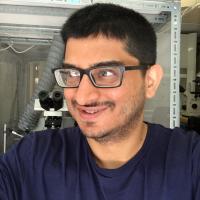
Agroecology Reading time 5 min
Abhishek Chatterjee, explorer of insect senses
Published on 16 August 2021
ECOSENS, at the heart of interactions between insects and their environment
Abhishek Chatterjee, a young researcher with rich research experience, is delighted to be part of INRAE. His reasons for applying for a position at the institute were many: INRAE’s reputation for excellence, the opportunity to easily turn his basic research into concrete applications, but also INRAE’s commitment, through its HR Excellence in Research Award granted by the European Commission, to ensure a healthy work-life balance.
Abhishek, who thinks of himself as a neuroscientist as much as an immigrant dad, took all of these factors into account when he decided to join ECOSENS, the Sensory Ecology Department of iEES-Paris in Versailles. “The goal of iEES-Paris is to analyse and model the organisation, functioning and evolution of environmental systems”, says Abhishek. More specifically, ECOSENS uses model insects to better understand the mechanisms of olfactory communication between living organisms and their environment.
Decode insects’ senses the better to trick them
Since he arrived at INRAE, Abhishek has been involved in three projects in particular: describing how chemosensory information is integrated by different neural circuits; determining how insects process odour blends and how other sensory signals can alter odour perception; and lastly, defining the transduction mechanisms of pheromonal signals in the olfactory receptor neurons of harmful insects.
This research is very conducive to concrete applications, especially in the field of pest control. “A better understanding of how insects detect a mixture of chemical signals in conditions close to their natural environment will optimise odour-based pest control methods. This type of targeted pest control spares the beneficial insects and protects crops while curbing the use of pesticides”, explains Abhishek. But as far as he is concerned, this research serves above all to create knowledge, and strengthen ties between countries through international cooperation.
A clear path for a young perfectionist with a taste for going against the grain
For Abhishek, it is this sincere fervour to create knowledge that is at the heart of the matter. “As a child, I was argumentative. The power of objective and irrefutable arguments amazed me. I felt a sense of dissatisfaction if I couldn’t fully understand what was going on around me”, recalls the neuroscientist. Is it any wonder, then, that he turned to science?
During his Master’s in Biophysics in Calcutta, he spent two months in the laboratory of Obaid Siddiqi, the famous neuro-geneticist behind seminal breakthroughs in understanding taste and smell: a brief encounter that smacks of revelation. Bitten by the neuro-genetics bug, Abhishek spent 2006 to 2011 doing a thesis at Texas A&M University, in the team of Paul Hardin, the scientist who discovered how the ‘period’ gene orchestrates circadian rhythms in animal cells. From 2011 to 2020, Abhishek went on to do two post-doctoral degrees: at the Institute of Molecular Pathology in Vienna, then another for eight years at the Paris-Saclay Institute of Neurosciences.
With 15 years of international experience under his belt, the spark that fuels the passion of INRAE’s new research scientist still burns bright. “Discovering new knowledge is such a joy, like peeling back a veil that was hiding reality from my eyes”, says Abhishek with a sparkle in his eye.
|
MINI-CV Since 2020 Research scientist, INRAE, EcoSens department, iEES-Paris, France |
